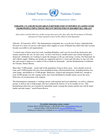Click to expand Image
Student activists protest against President Bidya Bhandari’s unwillingness to endorse the Citizenship Bill that was passed by parliament. September 21, 2022
© 2022 Rojan Shrestha/NurPhoto via AP
Nepal’s ceremonial president, Bidiya Bhandari, has refused to endorse a Citizenship Bill passed by parliament, denying an estimated 500,000 people access to citizenship documents and threatening to plunge the country into a constitutional crisis. A deadline for her to sign the law expired last week.
On September 25, the Supreme Court issued a notice asking the president’s office to provide its reasons.
Although the bill perpetuates several discriminatory provisions of previous laws, it provides an important step forward for some who have been denied citizenship. A group of people whose parents were earlier given citizenship “by birth” but who have not received citizenship themselves would be eligible for citizenship “by descent”: a measure that was promised in Nepal’s 2015 Constitution but has not yet been implemented.
According to a 2015 study, more than 4 million people – or 23 percent of the adult population – do not have citizenship papers, denying them basic rights such as the right to vote and access to government services. Many would not benefit from the proposed law.
There were protests on the streets of Kathmandu this week following the president’s decision. “We have been protesting for years … the Citizenship Bill was passed by both Houses of Parliament, but the president withdrew it and darkened our future,” said Indrajit Safi, president of the Citizenshipless Struggle Committee,
The bill does not address longstanding discriminatory provisions that make it harder for children of Nepali women to obtain citizenship than it is for children of Nepali men, affecting the children of single mothers in a variety of circumstances. While the child of a Nepali man is automatically entitled to citizenship, a Nepali woman must prove that the father of her child is Nepali, or declare that he is “unidentified.” If such a declaration is proved to be false, the woman would face prosecution.
There are also provisions that make it harder for the foreign husband of a Nepali woman to acquire citizenship than it is for the foreign wife of a Nepali man.
Politicians justify this discrimination on grounds of defending nationalism and “sovereignty”, but campaigners call it a patriarchal and misplaced “paranoia” which treats women as second class citizens. Many people are effectively rendered stateless as a result.
The government and legal experts say President Bhandari’s attempt to block the law exceeds her powers and violates the constitution. The issue is now before the Supreme Court.



